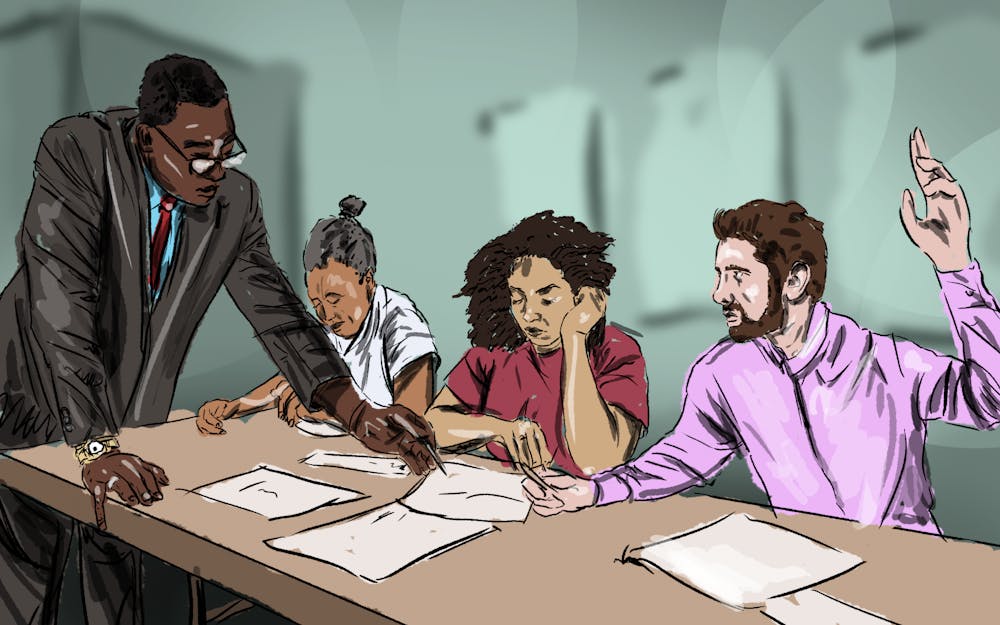The American worker will never be free until they have the freedom to fire their boss.
Stay with me here, I’m not even being a little facetious. Most Americans seem to value democracy, and they should. There’s an endless flood of articles one can read daily about threats to democracy, how our democracy is in peril — we’re worried about something we apparently care deeply about.
Now, I’ve written before that I think this is a bit silly — political democracy in America is practically nonexistent, and if something doesn’t exist it can’t be threatened. Marx can best sum up what I was trying to say in that column: “The oppressed are allowed once every few years to decide which particular representatives of the oppressing class are to represent and repress them.”
There are a million problems with our so-called political democracy in America, from gerrymandering to voter suppression, to the electoral college, to the Senate and Supreme Court and on and on. But the lack of democracy in America is most apparent not in the political sphere, but in the economic one.
The average person will spend 90,000 hours, or one third of a lifetime, at work. In the workplace, there is no democracy — the worker must submit to the total authority of their boss.
[Related: OPINION: There will never be freedom under capitalism]
The owner of a capitalist enterprise was not chosen by their employees, but they dominate them. The owner decides what an employee must wear, how they must act, what they can and cannot say inside and outside the workplace, when they must arrive and when they are allowed to leave.
They control their pay and time off, they constantly monitor their emails and surveils their productivity and in most states — Indiana included — they can fire them for any reason, or no reason at all.
The capitalist enterprise is, in a word, a totalitarian enterprise. The average person spends a third of their life under the unalterable dictatorship of their employer.
For a country that seems to care so much about democracy, we seldom talk about economic democracy — democracy in the workplace, worker ownership of the means of production.
What would such a democracy entail? For one, leaders would be democratically chosen, and subject to recall at any time. Furthermore, hours and conditions would be subject to input from the workers themselves, as well as what should be produced, how it should be produced and how the profits of that produce should be distributed. For most workers, such a workplace might seem unimaginable.
But the words “profits” and “most workers” give something away: a democratic workplace can, to an extent, exist under capitalism. The Mondragon Corporation in the Basque region of Spain is a prime example.
Mondragon is made up of 95 cooperatives and employs over 80,000 people, most of whom are partners, meaning they own the company. It is one of Spain’s largest companies.
Mondragon’s principles include a commitment to democratic organization – (“A one person, one vote system for election of the cooperative’s governing bodies and for deciding on the most important issues”) – and sovereignty of labor – (“Profit is allocated on the basis of the work contributed by each member in order to achieve this profit”).
It’s also worth mentioning that Mondragon produces significantly less inequality than the typical capitalist enterprise. Salaries for executives at Mondragon are capped at six times the lowest wage; the chief executives at the largest 350 companies in the U.S., meanwhile, are paid about 320 times as much as the typical worker.
And it’s worth repeating that this isn’t some small, fringe company: it’s one of the largest in Spain.
[Related: OPINION: There will never be equality under capitalism]
Of course, Mondragon isn’t an end-all solution to capitalist tyranny. The company still competes in a market system for profit and still produces inequality, all things that are antithetical to socialism. But we can still view it as a blueprint of a future we should be moving toward.
If we truly value democracy, then that value should extend to the workplace, where we spend a sizeable chunk of our lives. And despite the problems with political democracy in this country, there is still the belief instilled within us that if we don’t like a representative, if a politician is oppressing us, we vote them out of office. We fire the incumbent.
Let us embrace democracy to the fullest extent and fire the CEO as well.
Jared Quigg (he/him) is a senior studying journalism and political science.




